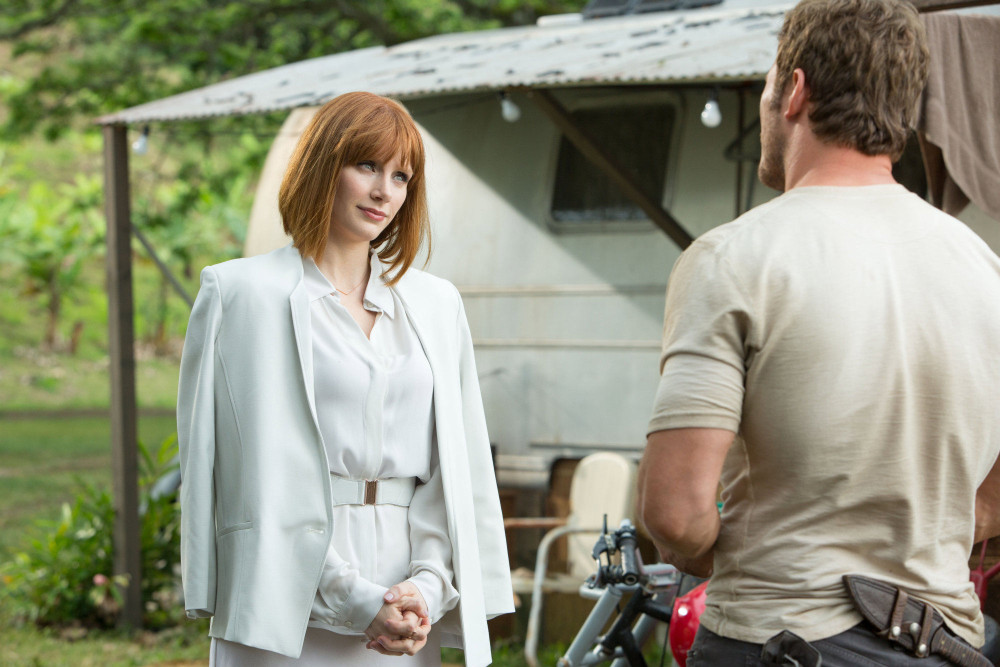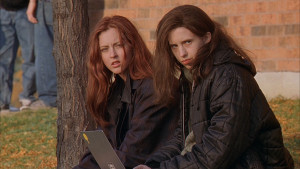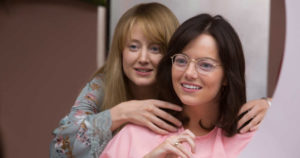
This essay directly continues from my review of Jurassic World and features spoilers for the film.
It’s unsettling to watch Jurassic World and realize that it’s a film with no genuine clue which character should be its primary focus. While Owen isn’t introduced to the audience until after Claire – and her family – is established as essentially the main character, the rest of the film seems to take issue with that. It places her in all sorts of situations that wouldn’t be fitting of the character we met at the beginning, and instead allows Owen to take the mantle of hero, even though he’s anything but one.
When it comes to Chris Pratt, no one seems exactly sure what his role as Owen in the film should be. Should he be the hero here to save the day? Should he be the man emotionally attached to dinosaurs like no one else? Should he be the stoic (read: generic) “badass” in an Indiana Jones costume? Should he be the condescending love interest for a woman who so clearly doesn’t need one? Well, he does all these things, and often enough, they cross over in the worst of ways.
From his first appearance, we’re introduced to Pratt as the cool guy who handles velociraptors, has his own packed trained, and cares about both dinosaurs and the people around him. His good-guy persona is emphasized by the fact that he shoots down the villainous Vincent D’Onofrio after his ten? twenty? sixty? minute speech about war and dinosaurs and something worse than Hugh Laurie’s diatribe about humanity in Tomorrowland. And yet, when it all comes down to it, he’s the first to immediately suggest using lethal weaponry against Indominus (reasonably so) and he’s the first to turn against his own velociraptors when they betray him (until they go back to his side and then he’s all cuddly again because CONSISTENCY!).
Worse than these though is a scene where Bryce Dallas Howard’s Claire finds herself crying about a dying brontosaurus – clearly meant to mirror Ellie Sattler & Alan Grant’s encounter with the triceratops in JP – while Pratt just glowers, but maintains his masculinity by not feeling anything. Considering the fact that prior to this scene, Claire has never shown interest in these dinosaurs outside of being work (a notion which she’s harassed for often enough), it makes next to no sense to have a single tear-drop fall at the sight of this dying animal. Owen, however, who has raised four velociraptors from birth and has been working at this park for heaven knows how long – intimately with dinosaurs – likely should have. That bland look of stoicism (one of three looks he used for the film as he jokes about in interviews), accompanied by some of the most trite dialogue in the script, leaves an actor who’s typically charming and amusing with little appeal in a film that wants to make him look cooler than his character is. Alas, he needs a weak-willed woman on his arm because Chris Pratt should be the leading man, right?
Wrong. Whether it’s the scripts fault – written by a grand total of four people – or the studios, there’s a grand inconsistency on who deserves the spotlight in Jurassic World: Claire or Owen. Trevorrow himself has been quoted on the fact that the lead character of the film is Claire:
[…] she’s the hero of the movie, and she’s the one who changes. She goes through a pretty massive arc, from being the head woman in charge and very corporatized, and very much governed by the needs of that corporation, to somebody who has kind of stripped herself of all the trappings, and become very at one with her inner animal — and the natural world.
And yet, the film itself seems at odds with that concept. Her character writing is a roller-coaster that soars to decent heights and falls to atrocious lows. For no lack of example, I’ll focus on a series of situations that truly left me aggravated while watching the film. When the pterodactyl attack happens, Claire defends herself (and others I believe) in a rather “badass” fashion, for lack of a better word. This is a woman who, as Trevorrow describes, was formerly a cold and clean-cut woman, breaking into an untapped strength for the sake of survival. In that moment, she’s kissed by Owen – seemingly out of nowhere because they formerly had a terrible first date and their dialogue to each other sounds straight out of a sad porno where no one ends up happy – and her nephews witness this.
This is the only thing that Claire’s nephews have witnessed Owen do at this point in the film, and yet minutes (or hours in movie time) later, the children suggest that they’d feel safer with Owen than they would with Claire. It’s as though having a motorcycle, kissing a woman, and having a vague knowledge of dinosaurs immediately trumps the fact that this woman has been hunting the park for you and kicking ass (in heels I might add) to survive. In fairness, Claire has spent a good portion of the movie being forced to hide behind Owen, and she continues to do so later in the movie for no good reason considering she’s brave enough to hunt down the original T-Rex from Jurassic Park and allow her (the T-Rex) to chase her (Claire) while holding a flare. But no, she hides behind Owen anyway. To add more insult to this, the nephews throw in a line to which Bryce Dallas Howard’s uncomfortable half-smile says everything about how awful it is: “Your boyfriend is a badass.”
In a film that is, realistically, meant to be about the journey of Claire and how she grows to communicate better with herself and her family, it makes one wonder why the romance between Claire and Owen was so forced into this film. For a film with so much fan service and casual attempting to mirror the original, it’s hard to understand why they’d ignore everything that made the relationship between Ellie Sattler and Alan Grant so successful. Rather than essentially throw all of Ian Malcolm’s worst qualities into the character of Owen, thus making one imagine what it’d be like if Ellie was paired up with him, an implied relationship between Claire and Owen the likes of Ellie and Alan would have been ideal. It’s the kind of thing that could have easily allowed a partnership between these characters to flourish in the environment of the film – and both Pratt and Howard to show off their skill at conveying emotion through body language rather than bad dialogue – allowing for equal screen time in which neither character had to play the weak role. Alas, this is not the film we’ve received, and as much fun as there is to be had elsewhere in Jurassic World, it’s hard to be particularly excited about it when it has so much bad, and easily avoided, character writing.



 Derek
Derek
 Isabelle
Isabelle